|
|
|
Sort Order |
|
|
|
Items / Page
|
|
|
|
|
|
|
| Srl | Item |
| 1 |
ID:
180535


|
|
|
|
|
| Summary/Abstract |
Many studies have identified the rise of the drug trade in the inner-city slums of Ankara’s Altındağ district in the wake of post-urban transformation projects (UTPs). However, none of them has thus far discussed the surge of such organized criminal activity in relation to the wider urban policy regime of Turkey. This paper offers the concept of advanced marginality to understand the complex relations between neoliberal urban governmentality and its repercussions in local areas, which results in UTPs, the disintegration of communality, the emergence of slums, and the rise of illicit enterprises. The paper argues that the formation of organized drug trade in Altındağ following the development of UTPs is an outcome of the advanced marginality resulting from the changing urban governmentality and its deliberate neoliberal political preferences.
|
|
|
|
|
|
|
|
|
|
|
|
|
|
|
|
| 2 |
ID:
180531
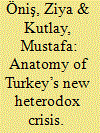

|
|
|
|
|
| Summary/Abstract |
A decade after the global financial turmoil, a new wave of crises is haunting the global South. This pattern is different from previous crisis episodes. Powerful shifts in the international order provide new policy space for emerging powers to manage their economic problems in a heterodox fashion. Key Western-led institutions no longer enjoy a monopoly in dictating the terms of financial assistance for countries in economic difficulty, as non-Western powers increasingly challenge the orthodox Washington Consensus paradigm. The present paper attempts to locate Turkey’s ongoing economic crisis in a comparative-historical context. Its central argument posits that the current crisis is the reflection of a fragile and unconsolidated presidential system and its associated mode of economic governance with state capitalist features. Turkey’s heterodox crisis allows us to draw attention to the complex interplay of global power transitions in a post-liberal international order and domestic political constellations during an era of growing authoritarian populism, generating a new equilibrium with rather unique features.
|
|
|
|
|
|
|
|
|
|
|
|
|
|
|
|
| 3 |
ID:
180537
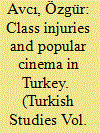

|
|
|
|
|
| Summary/Abstract |
Arabesk is a trademark of popular culture in Turkey. At its foundation lie injuries of class, emotional wounds that society inflicts on people’s sense of dignity and freedom. Literature on arabesk has long underemphasized this salient fact. A syntagmatic and paradigmatic analysis of the narrative structure in thirty melodramas shows that the agony around which arabesk stories unfolds is rooted in class conflict. This study also reveals remarkable parallels between depictions of love in arabesk films from decades ago and the lower classes’ imagination of love today. Thereby, it provides confirmation of the importance of assessing the works of popular culture accurately if we are to better understand the psyche of their target audience in Turkey (and elsewhere in the capitalist world), which is primarily the subaltern segment of society.
|
|
|
|
|
|
|
|
|
|
|
|
|
|
|
|
| 4 |
ID:
180536
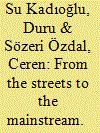

|
|
|
|
|
| Summary/Abstract |
Turkish rap music has dominated the scene since 2017. This transformation occurred very quickly. Turkish rap was pioneered by alienated Turkish immigrants in Germany. Initially, it served as a tool for self-expression and dissent from an underground position. Although political rap gained popularity for a short period during the Gezi protests, today’s rappers are turning into influencers rather than protestors and harming rap’s ability of social expression. This research focuses on Turkish rap music’s integration with the current capitalist industries by using the perspectives of both cultural studies and political economy through interviews with industry professionals and historical analysis.
|
|
|
|
|
|
|
|
|
|
|
|
|
|
|
|
| 5 |
ID:
180533
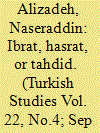

|
|
|
|
|
| Summary/Abstract |
This study examines the ways in which various aspects of Turkish modernity, including gender reforms and nation-building, were reconstructed by the Berlin Circle, whose members were the ideologues of nationalist authoritarian modernization in Iran. To this end, I analyzed texts published between 1923 and 25 in Iranshahr and Nameye Farangestan, two important periodicals of the Berlin Circle. The results of this study show that while gender reforms were welcomed, longingly desired [hasrat], and upheld as a lesson [ibrat], Turkish nationalism was mostly perceived as a threat [tahdid]. This decentralized and horizontal view towards Turkish modernity suggests that its reconstructed image served to transfer and propagate different messages that implied the possibility of modernization reforms in an Islamic country like Iran and induced anxieties to push Iranian society to an imagined ideal future.
|
|
|
|
|
|
|
|
|
|
|
|
|
|
|
|
| 6 |
ID:
180532
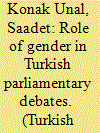

|
|
|
|
|
| Summary/Abstract |
This paper assesses the substantive representation of women through parliamentary speeches in Turkey with the goal of determining whether legislative behavior differs across gender. By using content analysis of parliamentary speeches given in the Turkish Grand National Assembly between 2002 and 2011, this paper evaluates who speaks more often and on which policy areas they focus. More specifically, it examines the relative participation of women as well as the subjects they choose to address. The analysis of Turkish case is important not only to further our understanding of Turkish politics but also to improve our understanding of women in parliaments with low gender parity. The results reveal that, although there is no significant difference between female and male legislators in terms of the total speeches they delivered, gender differences exist regarding the policy preferences of MPs, even after controlling for partisan, constituency and institutional factors. Female legislators are more likely than their male colleagues to prefer speaking about women’s equality issues, children and family issues, and education. In contrast to previous findings, female legislators are as likely as male legislators to prioritize speaking on health care issues.
|
|
|
|
|
|
|
|
|
|
|
|
|
|
|
|
| 7 |
ID:
180534
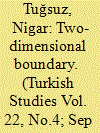

|
|
|
|
|
| Summary/Abstract |
Alevi-Sunni relations in Turkey are the result of a relational process constructed from contributions of each side rather than each groups’ perceptions of the other. Boundaries between Alevis and Sunnis in Turkey have been constructed relationally with the contributions of many complicated socio-political factors. This article aims to answer the question of what the symbolic boundaries between the two groups are, seeking to understand how Sunnis perceive Alevis. This aim will cast light on the nature of the two groups’ relations, help us recognize forms of Alevism and Sunnism specific to Turkey, and advance existing literature on the issue. This paper’s findings are based on ninety semi-structured and two focus group interviews with Sunnis living in Istanbul. Results show that the concept of ‘two-dimensional symbolic boundary,’ which runs along dimensions of not-knowing and not-accepting, is the answer to the question of how Sunnis perceive Alevis. The main components of these dimensions are perceptions, which seem to relate to the interpretations of group norms and values. This study, as a group-based analysis, reveals that perceived group norms – whether religious, cultural, social, or political – determine the perceptions of Sunnis towards Alevis and create dimensions of the boundary between the two groups.
|
|
|
|
|
|
|
|
|
|
|
|
|
|
|
|
|
|
|
|
|